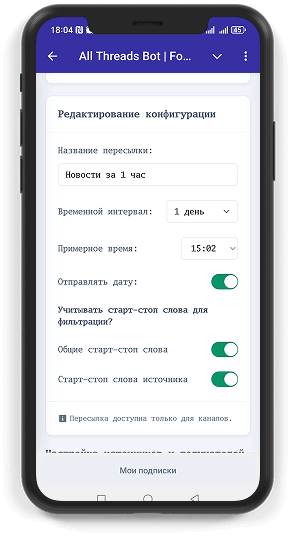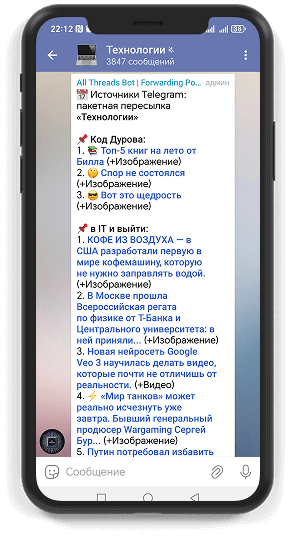Telegram Batch Forwarding
Batch forwarding is a convenient way to receive concise digests from selected Telegram channels for a specified period. This format is ideal for secondary sources: you won't miss interesting materials, but you can read them at your convenience without being distracted by every new message.

How to Create a Batch Forwarding
- On the Telegram sources management page, click the + Create Forwarding button.
- Enter a forwarding name (2 to 128 characters).
- After creation, it will appear in your list of forwardings.
INFO
The number of available forwardings depends on your profile.
Forwarding Setup: Step by Step
1. Current Configuration
In this block you will see:
- How often the digest will be sent (e.g., once a day, once a week, etc.);
- When the next mailing is scheduled.

If you no longer need the forwarding, use the Delete Forwarding button—all settings will be deleted irreversibly.
2. Editing Configuration
In this section you can:
- Change the forwarding name;
- Set the sending interval (from 1 hour to 7 days);
- Set the approximate send time (for intervals from 1 day);
- Enable or disable date display in the message;
- Choose whether to use global or local start-stop phrases for content filtering.

INFO
For a weekly interval, you can select the specific day of the week for the digest.
INFO
The specified time is approximate. Actual sending time may differ.
3. Source Setup
You can add only Telegram channels to a batch forwarding (groups are not supported). A channel can participate in only one batch forwarding.

4. Receiver Setup
Select where the final digest will be sent:
- To the chat with the bot;
- To a channel, group, or Telegram group topic—just like for regular sources.

What the Final Digest Looks Like
The forwarding post contains concise excerpts from all selected channels for the specified period. Message structure:
- Information is grouped by source;
- The header is the first line or up to 100 characters of text;
- Date and time (can be disabled in settings);
- In parentheses—the type of attachment (e.g., image, video).

